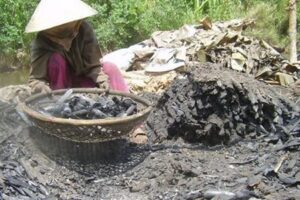This story is a powerful reminder that energy poverty is not limited to sub-Saharan Africa. We need to find solutions and adapt them to solving the problem wherever it exists. This article was reported in Thanh Nien news, “the tribune of Vietnam’s Youth Association.”
Poor burn mangrove for charcoal in southern Vietnam
Last Updated: Thursday, June 13, 2013 12:35:00
Many poor people in the southernmost province of Ca Mau burn forests to obtain charcoal, running the gauntlet of years in jail and even shooting by rangers.
“We know we are burning our own homes, but what else can we do to feed ourselves?” Lao Dong newspaper quoted a man named Ngang living in the Kien Vang protected forest as saying.
People in the area do not own farmland and thus have no other way to make a living, he said.
“We are just desperate.”
A family earns a couple of dollars a day from the job since a kilogram of charcoal fetches VND9,000 at most.
But to have that little something to eat sometimes could mean being jailed or even killed, he said.
His neighbor Le Minh Vui was shot dead while rowing a boat in a mangrove forest last month by rangers who suspected he was there to illegally fell trees.

Local authorities said the 42-year-old man did not stop the boat as ordered and rowed it straight at the officers, “severely” injuring two of them, forcing one to fire his gun.
Vui died on the way to hospital.
His sons said they had been chopping trees while his father waited in the boat. They heard the gunshot and rushed to see, only to find his body being taken away by the officials.
The next day they were informed he was dead.
The Ca Mau Province chairman has ordered an investigation into the death.
Ngang has stopped illegal logging after doing five years in jail for felling five cubic meters of mangrove to make charcoal and resisting rangers’ efforts to stop him.
He survives by doing trivial jobs.
“My father named me Ngang (head up), but for more than 30 years I have never had a chance to raise my head.
“Sometimes I just want to end my life.”
It was not just the years in jail that put him off logging, he said.
He had simply had enough of having to slog while constantly worrying about getting caught.
He recalled coughing blood in jail, not because of any beating there but as a result of working day and night and carrying heavy loads from the forest to a discreet burning place.
The nights had been “terrible” since he was afraid of ghosts and even more of the rangers.
It would take two days to burn the wood into charcoal, and he risked losing everything if caught.
Another local man named Tung owns a 3,000-square-meter shrimp farm but the severe droughts of the last two years put paid to his livelihood, and he has been making charcoal to survive.
Officials look the other way when he logs trees, but expect a payoff in the form of chicken he has to cook for them, he said.
Ca Mau authorities said they have caught more than 310 people burning trees since 2012, but the activity has not ceased.
Documents kept in a museum in the neighboring Bac Lieu Province show that though mangroves have always been protected, they have been felled to make charcoal since as long ago as 1958 and not just by poor people.
The charcoal was loaded on to boats from Ho Chi Minh City, then called Saigon.
The boats were believed to belong to Tran Le Xuan, the wife of Ngo Dinh Nhu who was the brother and chief adviser to president Ngo Dinh Diem of the US-backed South Vietnam regime, and so officials did not dare stop them.
“Tran Le Xuan charcoal,” as it was dubbed, helped destroy more than one million cubic meters of mangrove in just 1960-61, according to the documents.

